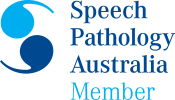Syllable-timed speech
Syllable-timed speech techniques (STS) like the Westmead Program have been used for hundreds of years. The technique works by saying each syllable with equal stress to a rhythmic beat like a robot. The Westmead Program differs from older STS treatments as it doesn’t require any props such as a metronomes maintain the beat; the child doesn’t have to speak very slowly in a monotone voice or pre-programmed steps that start with single sounds and work slowly up to conversation.
The program has a few similar features to the Lidcombe Program in terms of structure.
Here are some of the key features
- Two stage program
- Administered by parents or other carers who measure average stuttering severity
- Measures taken daily using the Lidcombe Program’s 1-10 scale.
- The technique is learned and practiced 4-6 times a day for 5-10 minutes each session
- Once stuttering reduces the child enters a maintenance phase where the treatment is slowly withdrawn under the supervision of a speech pathologist to minimise relapse risk, until stuttering is eliminated or almost eliminated.
The theory underpinning the program is that syllable stress variations in natural speech are a stuttering “trigger” in children with a vulnerable speech motor system. STS is believed to induce long-term improvements in stuttering severity before a child’s neural pathways for speech are established. The treatment works only for children and the effects of STS are usually only temporary for adults who stutter. The Westmead Program does not yet have the same level of evidence to support its effectiveness as the Lidcombe Program however; there has been some headway in the growing evidence to support this program.
Cheryl Andrews and her colleagues from the ASRC, have just published the results of their Phase II trial of a syllable-timed speech treatment particularly focused school-aged stutters which has previously been an age group without evidence based program for treatment. Results from the study have been very promising and looks to be a viable option for children who have not had successful treatment through the Lidcombe program for one reason or another or are too old for Lidcombe to be an effective treatment option.
It gives speech pathologists practical clinical support (and confidence) to keep working with families to tailor evidence-based treatments to the particular challenges and needs of school-age children who stutter.
Contact us for results focused speech therapy
This article was written by our Speech Pathologist Ashleigh Fattah who is a Speech Pathology Australia member. If you have difficulties with speech, make an appointment. We‘ll provide you with simple and effective therapy targeted to your concerns. Contact us today.
The post The Westmead Program for Stuttering Therapy appeared first on ENT Wellbeing Sydney.










